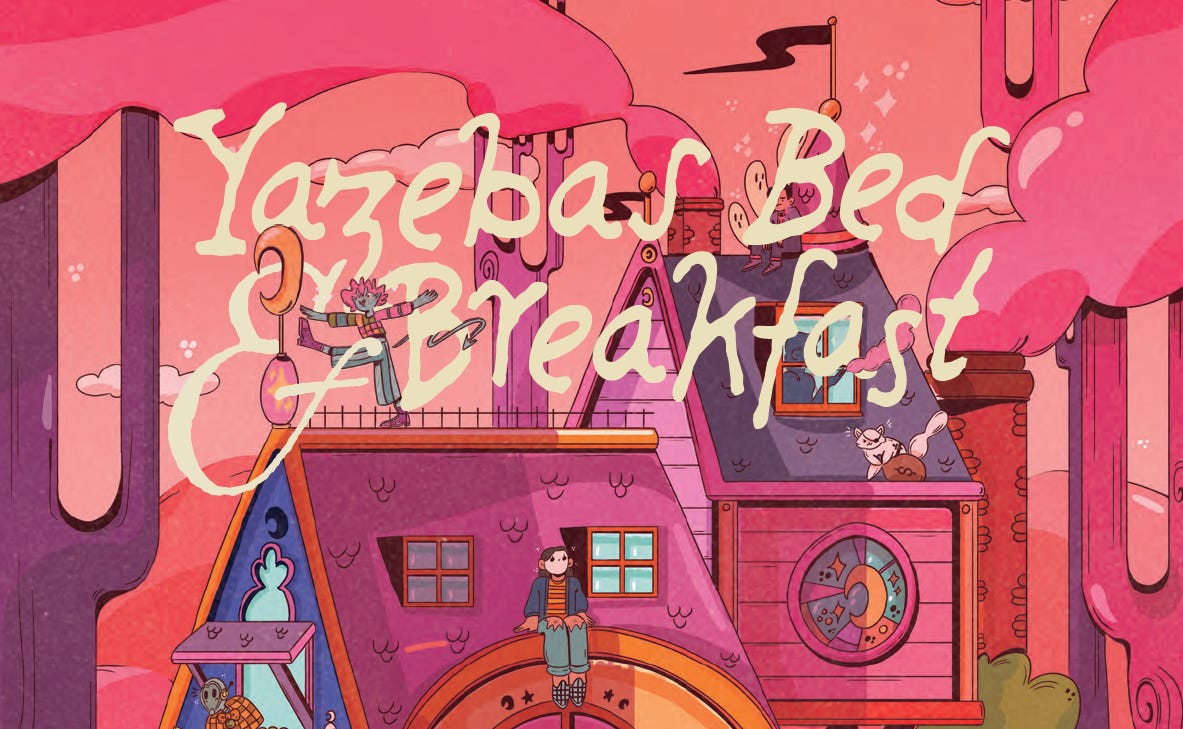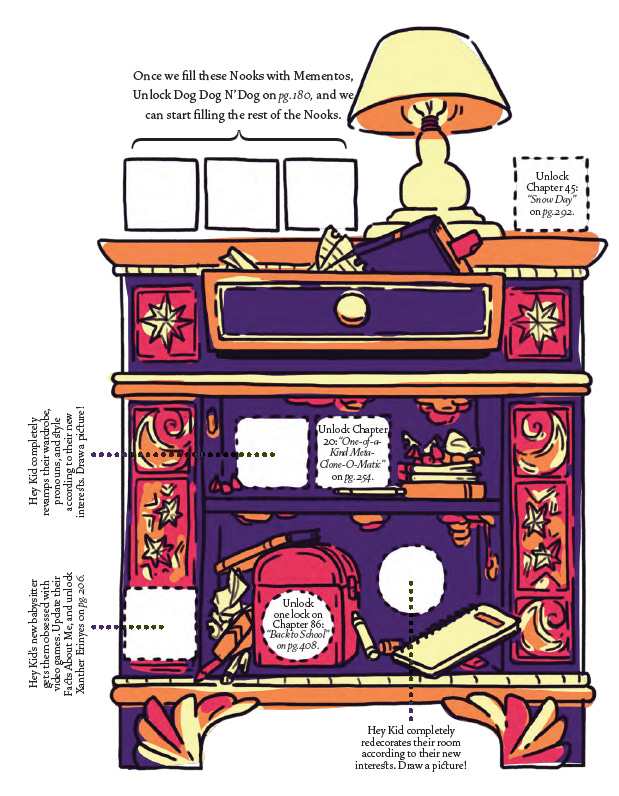Defining Home in 'Yazeba's Bed & Breakfast': A Review
A review
Let me tell you the moment that Yazeba’s Bed & Breakfast broke my heart - which is also the very moment I fell in love with the game.
I had been reading and rereading the rules, before everything else, going through it meticulously, gathering a sense of how to play the game. On rules alone, I was intrigued by the game, and admiring of its ambition, but it wasn’t until I began reading the character sheets that the real power of the game hit me like a punch to the gut.
Gertrude - who is the closest thing this game has to a POV character and protagonists - is the first character sheet presented, and it includes a ‘Facts About Me’ section, with a sub-heading that reads, “Add to them, or cross them out when they’re no longer true.”
The very first item listed there is “I am a moody teenager.”
Instantly, I was hit by the kind of ache you only get as a grown-up recognizing that youth once gone never returns. The nostalgia you have for times past, when everything about the world was fresh, and new, and upsetting, and you didn’t know how wrong you were about things, you didn’t know how right you were about things, but you damn well knew how strongly you felt about them. It wasn’t “moody” that got to me so much as the word “teenager” - and in its placement, the suggestion that as the game goes on, “teenager” might no longer be a word that applies to Gertrude any longer.
There is incredible potential for growth in Yazeba’s Bed & Breakfast, in a way I have never seen another TTRPG present. It is a single place, fixed in time, a single story that can be told a thousand different ways, but growing, always growing. About community. About becoming who you have chosen to be - and having the agency to decide how fast that happens, when that happens, and how that happens. It is a game about making memories.
And how badly you will miss them when they’re past.
(Let’s get one thing out of the way quickly: the book states, and constantly repeats, that you do not have to play the game as written. There is no rule you cannot rewrite if you prefer it, no section you cannot simply just ignore - the book repeatedly encourages you to play this game your way, changing as much of it as you’d like.
For the purposes of this review, I will try not to venture too far into the hypotheticals of what this book could be, and will review it as written.)
What is Yazeba’s Bed & Breakfast?
The thing that sets Yazeba’s Bed & Breakfast is that you are not creating your own characters, nor are you creating your own setting. The person running this game - known as the Concierge - does not have to come up with quests, and NPCs, nor are they tasked with creating an overarching plotline, or anything of that sort.
Characters have been pre-written, and it’s the players who choose which ones to play - and the characters they choose to play might change, in every session. Scenes have been pre-written, each with their own mini-rules, some with their own mini-games - each explores a certain story, and have set beginnings, set end conditions. And it is all always, always set at Yazeba’s Bed & Breakfast.
This concept might be off-putting, for those who enjoy the narrative freedom most TTRPGs provide. This is not a game about telling any story you can imagine; it’s a game about telling these people’s stories, at this particular place. To paraphrase the book itself, you are playing out a Saturday Morning cartoon series, or rewriting a series of beloved children’s books, or, perhaps most relevantly, a series of fan-fiction pieces posted online - but, like fan-fiction, there is no end to the number of stories that you can tell with the same characters - even in the same scenes.
To play, the Concierge picks out a Chapter (the order doesn’t matter; and indeed, none of the Chapters are ordered correctly). Players then pick up a relevant Character, and their character sheet, choosing between guests and residents. A player may choose a character they’ve picked before, or pick someone entirely different - no one player necessarily has claim to any one character, and no character is necessarily in every scene within the house.
On a practical level, as a GM who has been trying for years to figure out how play games when people’s schedules are erratic, this is genius. Not everyone needs to show up for every session of this game. New people can be added to the game, and leave it, at any time. A game can be picked up and played at the very last minute, with no prep needed from the Concierge - and the Housekeeping that is done afterwards has minor rules to help with continuity across sessions. It can be played with a small group, with a large party - or even played alone.
Every character has Whoopsies (actions borne of personality flaws) and Bingoes (actions that are the characters at their best), which helps you roleplay them, as well as provide mechanical benefits that change depending on what kind of Chapter you wish to play. There is a little prose at the start of each Chapter, that sets the scene, and rules that encourage new kinds of activities in play - but there is a lot of freedom in how a Chapter actually plays out. Enough freedom, in fact, that the same Chapter can still be played multiple times, which means if you’re playing with me, we will likely be playing the Chapter about doing dishes and wondering if you’re enough at least a dozen times.
The Appeal
This book is charmingly written, with blocks of prose that show up every now and again to draw you further and further into the world that the game has created. It’s characters are a beautiful mix of whimsy and deeply human insecurities balanced by inspirational actions that make them all true gems. Each of them has personal journey to make through this game, which unlock more journey’s still.
The writing in this book is beautiful. The frequent pieces of prose will make you love the setting more and more with each new one that pops up. There’s a sense of whimsy in its formatting - chapters are all out of order. A few are even hidden. One part of the book has you doing an Easter Egg hunt for illustrations of The Rabbits in the Garden, who Wear Little Outfits.
The setting itself is equally charming - a Bed & Breakfast inn set far away from the hustle and bustle of civilization, with a rotating cast of guests, secrets to uncover in its various rooms, all run by an ornery witch who sold her heart to create a place where everyone can be safe, and be themselves. It is cozy, it is sweet, and it is welcoming. However, if that was all that it was, this could simply be another Wanderhome setting. What this game aims to be is something else entirely.
The thing that excites me most is that this game has unlockables. Certain characters, and chapters are “locked” until you have filled out the requirements necessary to add them to the game. Yazeba’s Bed & Breakfast asks you to wait. To be patient. To earn new stories, new settings, new questions and quests. Even the basic character sheets have trackable journeys, that are filled out at the end of each chapter - and once a Journey is complete, it unlocks a new one, leading a character down a new path of growth.
There is a lot of content to be unlocked, easily half the book. That, more than anything, makes the game feel like something that is truly invested in the ways a story can grow. It forces players to pace themselves. It forces you to take your time - to appreciate moments as they happen. For new stories to be built on the memories and the contexts of what’s happened before. As written, you cannot truly grow in this game without having lived, and contributed to the stories, and grown closer to the people around you in small, domestic, shared moments that are a mix of fun, eeriness and pensieve moods. The game requires growth to come along with narrative context, and it does to to an unprecedented extent - and it makes you incredibly excited about finally getting to see the things that have been locked (for the sake of this review, I peeked ahead, and let me tell you: it’s worth waiting for).
As your characters play, they will build a little scrapbook’s worth of keepsakes, of index cards with questions that linger from pensieve chapters, with particularly fond memories and stickers, of doodles, and promises of new journeys. The inn itself fills up, blank spaces left for memories to be stored. This might be the biggest flaw of the game; depending on how you look at it. It requires a messy amound of paperwork to keep track of things - it’s much better suited for physical play than online play. It’s work to keep track of - but arguably, work that’s worth it, as you look at a folder full of memories, and see how far your favourite characters have come.
Setting the game in a single place - one that grows, and changes, and evolves as you play through it - is a beautiful way to ground your characters. To bring your story to life, as imagination floods the inn’s halls and then settles, becoming ever and ever more familiar. It is a game that has been crafted with love, and a game that will inspire more love for all will have play it. It’s a game that requires you to play it enough times that it becomes a new home, shared by everyone who’s visited it - and along the way, it’s a game that will have you defining what home truly means.
In my experience, it’s usually other people…but I can’t be entirely sure until I’ve unlocked the Moon Prince on Page 166.
You can purchase the game here: https://possumcreekgames.itch.io/yazebas-bed-breakfast, and I would like to thank Jay Dragon, co-creator of this game, for the review copy.
As a bonus little treat, I my next email will be a “fanfiction” playthrough of one of the game’s chapters: Firefly Catching (in which Sal and Hey Kid talk about getting older, while catching fireflies).






How many pages is the book?